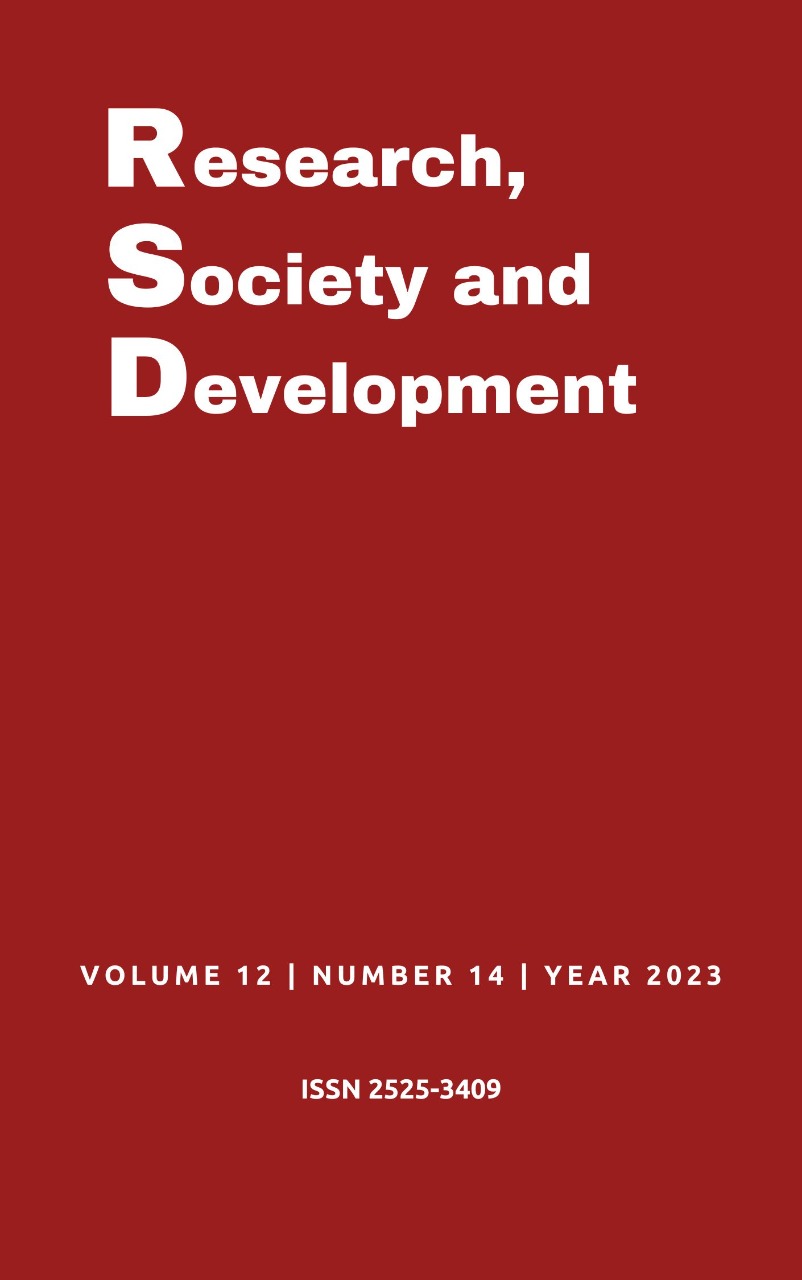Importance of obstetric nursing in reducing unnecessary interventions during labor
DOI:
https://doi.org/10.33448/rsd-v12i14.44521Keywords:
Obstetric nursing; Healthcare models; Childbirth.Abstract
Objective: To identify the importance of obstetric nurses in reducing unnecessary interventions during natural childbirth. Methodology: An integrative review of the literature was carried out in the databases: Latin American and Caribbean Literature in Health Sciences, Scientific Electronic Library Online and Medical Literature Analysis and Retrieval System Online, with the descriptors: obstetric nursing, care models to health, childbirth, with inclusion criteria for a comprehensive search of the topic, where the final sample was 11 studies, which were used to form the discussion. Results: Through the general apparatus of the results, it is possible to see that the importance of obstetric nurses in reducing the use of interventions lies in the support they give to women in labor, improving this moment to the point where interventions are not needed, and it is completely natural. Conclusion: It was possible to verify that the obstetric nurse has a fundamental role in natural birth, both in promoting health and in reducing unnecessary interventions during this moment that needs to be healthy and natural. An important fact to be mentioned in this data collection is that this work was essential in the profile of the obstetric nurse in the face of humanized techniques during the birth process, as it is evident to describe this model of health strategy. Finally, we hope that the article has brought knowledge on this topic, considering a contribution role in future research in an efficient manner.
References
Alves, A. C. O. (2022). A importância do enfermeiro obstetra para o nascer natural: vivência de estudante de enfermagem no resgate de uma gestante do parto cesáreo para o natural. Rev. Brasiliana Journal of Development. 8(10), 66170-66181.
Amaral, R. C. S. A., Alves, V. H., & Pereira, A. V. (2018). Inserção do enfermeiro obstetra no parto e nascimento. Rev. enferm UFPE. 12(11), 3089-97.
Aymberé, A. L., Oliveira, R. C. A., & Júnior, L. R. G. (2020). A importância da enfermagem obstétrica no parto normal. Rev. Saúde em Foco.12(1),1-8.
Batista, S. K., & Carvalho, C. D. C. (2021). Partos atendidos pela enfermagem obstétrica em um hospital público de saúde: análise de dados. Rev. Health Residencies Journal. 3(15), 241–254.
Cavalcante, L. G., et al. (2021). Estratégias do enfermeiro obstetra para diminuição dos métodos intervencionistas durante o parto normal. Rev. Research, Society and Development. 10(2), 1-12.
Cavalcante, A. M. R., et al. (2022). A influência do parto humanizado na intensificação do vínculo mãe - filho e na redução de intervenções médicas. Rev. Eletrônica Acervo Saúde. 15(8), 1-8.
Lima, M. M., et al. (2020). Enfermeiras obstétricas no processo de parturição: percepção das mulheres. Rev. Enfermagem. 28(1), 1-7.
Magalhães, T. T. S & Taffner, V. B. M. (2020). Dificuldades para a atuação autônoma do enfermeiro obstetra no Brasil. Rev. Revisa. 9(4), 685-97
Martins, G. M., et al. (2022). O papel da enfermeira obstétrica no trabalho de parto normal de risco habitual. Rev. Braz. J. Surg. Clin. Res. 41(2), 50-56.
Melo, J. K. G., et al. (2019). Cuidados e métodos não-farmacológicos de alívio da dor nas gestantes em trabalho de parto. Rev. de Psicologia. 3(44),73-86.
Mendes, K. D. S., Silveira, R. C. C. P., & Galvão, C. M. (2008). Revisão integrativa: Método de pesquisa para a incorporação de evidências na saúde e na enfermagem. Texto Contexto Enferm. 14(4), 758-64.
Oliveira, O. S., et al. (2020). Enfermeira obstetra e os fatores que influenciam o cuidado no processo de parto. Rev. Gaúcha Enferm. 42(1), 1-12.
Pieszak, G. M., et al. (2019). As relações de poder na atenção obstétrica e neonatal: perspectivas para o parto e o nascimento humanizados. Rev. Eletrônica Acervo Saúde. 26(3), 1-6.
Rocha, F. B. (2022). A atuação do enfermeiro obstetra na redução de intervenções dispensáveis no trabalho de parto e parto. Dissertação (trabalho de conclusão de residência) - UFGD, Dourados, MS.
Rodrigues, K. (2021) No Brasil das cesáreas, falta de autonomia da mulher sobre o parto é histórica. FIOCRUZ.
Santos, L. B. E., & Lipinski, J. M. (2017). A enfermagem obstétrica e suas contribuições na humanização do parto: revisão de literatura. Anais do 9º Salão Internacional de Ensino, Pesquisa e Extensão - SIEPE Universidade Federal do Pampa, Santana do Livramento.
Santos, C. B., et al. (2020). Métodos não farmacológicos de alívio da dor utilizados durante o trabalho de parto normal. Rev. Global Academic Nursing Journal. 1(1), 1-8.
Silva, G. B., & Mendonça, T. (2021). O papel do enfermeiro obstetra no parto normal humanizado. Rev. Científica Multidisciplinar Núcleo do Conhecimento. 1(6), 5-25.
Sousa, L. M. M., et al. (2017). A metodologia de revisão integrativa da literatura em enfermagem. Rev. Investigação em Enfermagem. 2(2), 17-26.
Vargens, O. M. C., Silva, A. C. V & Progianti, J. M. (2017). Contribuição de enfermeiras obstétricas para consolidação do parto humanizado em maternidades no Rio de Janeiro-Brasil. Rev. Esc. Anna Nery. 21(1), 1-10.
Downloads
Published
How to Cite
Issue
Section
License
Copyright (c) 2023 Débora Castelo Branco de Oliveira; Adriana Quaresma de Souza Carvalho; Catarina da Costa Ribeiro Silva; Leônida da Silva Castro; Giulia de Melo Gedeon

This work is licensed under a Creative Commons Attribution 4.0 International License.
Authors who publish with this journal agree to the following terms:
1) Authors retain copyright and grant the journal right of first publication with the work simultaneously licensed under a Creative Commons Attribution License that allows others to share the work with an acknowledgement of the work's authorship and initial publication in this journal.
2) Authors are able to enter into separate, additional contractual arrangements for the non-exclusive distribution of the journal's published version of the work (e.g., post it to an institutional repository or publish it in a book), with an acknowledgement of its initial publication in this journal.
3) Authors are permitted and encouraged to post their work online (e.g., in institutional repositories or on their website) prior to and during the submission process, as it can lead to productive exchanges, as well as earlier and greater citation of published work.

